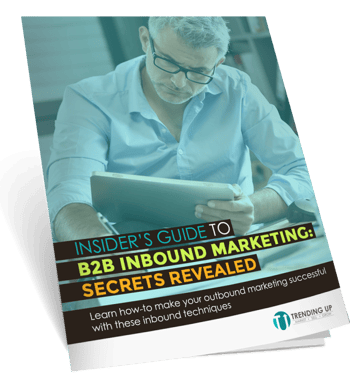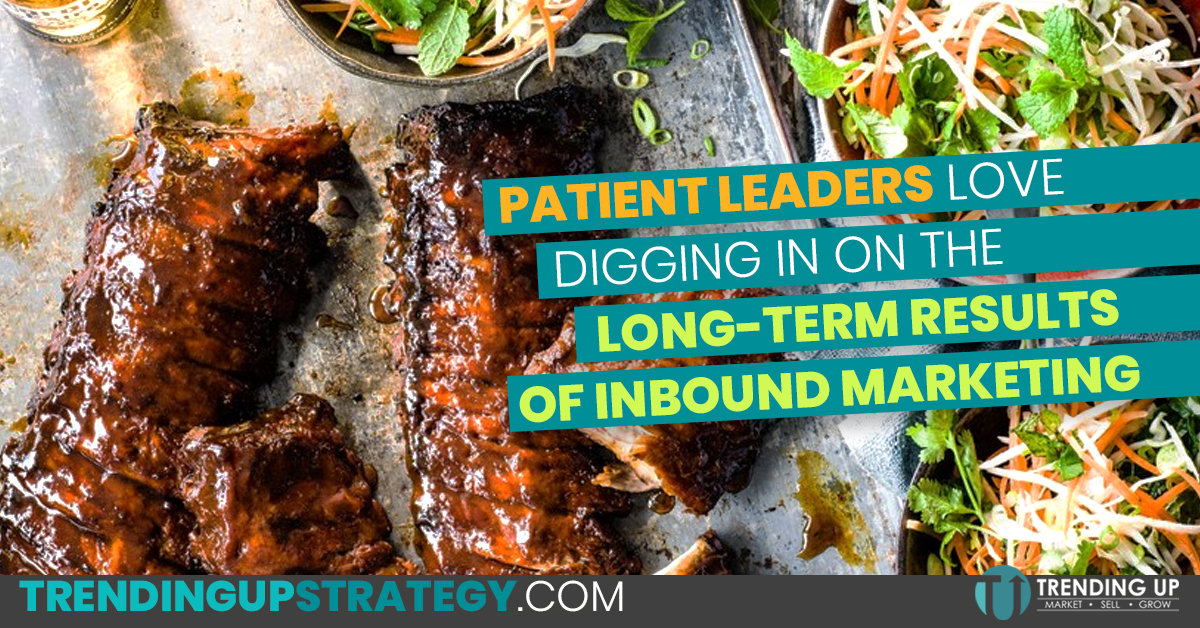Focus on the Buyer: Why Choose Inbound Marketing for Manufacturing
Marketing for manufacturing companies is not an easy job. Traditional marketing methods focuses on the seller - what you have in stock, what you need...
4 min read
 Jenna Orrock
Oct 04, 2016
Jenna Orrock
Oct 04, 2016

 Your manufacturing business has a very specific audience. Perhaps your industry is incredibly specialized, and you only create your product for one specific purpose. Or maybe you’ve determined that your product has the most influence at enterprise-level companies where there is already a demand. Whatever the audience looks like, they have some demands of you; are you meeting them in your marketing?
Your manufacturing business has a very specific audience. Perhaps your industry is incredibly specialized, and you only create your product for one specific purpose. Or maybe you’ve determined that your product has the most influence at enterprise-level companies where there is already a demand. Whatever the audience looks like, they have some demands of you; are you meeting them in your marketing?
Respondents to the 2016 B2B Buyers Survey from DemandGen said the single most influential aspect of any vendor’s website is “relevant content that speaks directly to [their] company.” In fact, 69% said it was “very important,” while 27% said it was “somewhat important.”
As a manufacturing marketing leader, you should be able to provide the information prospects want while also benefitting your ROI and bottom line. The good news is that you can; marketers see an increase of 19% in sales when using personalized web experiences. [The Realities of Online Personalization, Econsultancy and Monetate, 2013] Creating relevant content that targets your core audience while converting those audience members to leads is how you’ll create a lead generation machine. Utilizing a highly targeted inbound marketing strategy is the way to do this.
If you start your marketing efforts by identifying one key buyer, such as an engineer or project manager, and then build a strategy for this one type of buyer persona, your website traffic and website leads will be more qualified than a strategy attempting to bring as many people as possible to your site. Why? Because the content will be built specifically to attract those very buyers. As noted above, buyers want to know that you truly understand their nuanced business. A highly targeted inbound strategy can help you showcase that. Here's how:
Buyer personas are highly targeted fictional representations of your ideal prospects. To create one, you must identify the business role, industry, budget, location, goals and problems of your ideal customer. Creating this persona allows you to truly focus your strategy in a unified direction. Far from excluding prospective manufacturing leads, this method will instead help your business content online, and distributed via salespeople, to attract the very customers you’re trying to reach. For niche manufacturing companies, an inbound marketing strategy will provide the content blueprint to successfully solve the problems your prospects are seeing answers to.
 The major reason to create highly-targeted website content for your manufacturing prospects to visit is because it’s what they want. Business researchers want to know immediately “how any new product will ultimately benefit their business,” says DemandGen’s latest B2B Buyer’s Survey Report, by demonstrating a strong knowledge of the buyers’ industry, company and needs. This means that you should create an entire strategy around one buyer persona - role, industry, and goals. Then, you can add additional strategies for more personas. But you must to do thoroughly; half-done campaign strategies will be ineffective.
The major reason to create highly-targeted website content for your manufacturing prospects to visit is because it’s what they want. Business researchers want to know immediately “how any new product will ultimately benefit their business,” says DemandGen’s latest B2B Buyer’s Survey Report, by demonstrating a strong knowledge of the buyers’ industry, company and needs. This means that you should create an entire strategy around one buyer persona - role, industry, and goals. Then, you can add additional strategies for more personas. But you must to do thoroughly; half-done campaign strategies will be ineffective.
Most obviously, you can create very specific content for your site that targets your exact audience. But beyond that, personalization on your site will aid in the positive impact your site can have on a buyer’s research process.
The Content Marketing Institute says, “Personalization is the process of targeting content to individuals based on one or more of the following: who they are; where they are; when, why, and how they access content; and what device they use to access it, according to Scott P. Abel of The Content Wrangler.” Personalization tactics include product recommendations, targeted calls-to-action, and automated inbound marketing content.
Research from VB Insight indicates that only 20% of B2B buyers purchase mostly from a sales representative today. Therefore, personalizing as much of the online - and offline - buyer experience as possible is becoming a must-have for manufacturing sellers.
Content marketing, particularly inbound marketing using premium content offers, is a differentiator for niche manufacturing companies with long sales processes whose buyers conduct months of research prior to making a decision. 78% of consumers believe that companies behind content are interested in building good relationships. [McMurray/TMG via Hubspot, 2015] If that’s a top goal of yours, then content marketing with premium content offers is built for you.
 Some major premium content pieces include:
Some major premium content pieces include:
Placing these high-value pieces behind a form will help to generate leads. But simply having the content is not enough; it must speak directly to your ideal prospects. Be ultra-specific in your content. Too often, marketers try to cast a wide net by being general; this is not the time. “Specificity increases credibility because specific details are simply more believable than broad assertions," urges Copyblogger's Brian Clark. But beyond that, update website design and content to highlight the biggest needs of your target audience: strong knowledge of the business landscape, ROI, and peer reviews of your solutions.
79% of marketing leads never convert into sales. Lack of lead nurturing is the common cause of this poor performance. According to a Marketo benchmark study, on average, 50% of leads are not yet ready to buy when they initially come into your pipeline. “Lead nurturing creates automated, ongoing communication with your potential buyer throughout the sales cycle and beyond— maximizing results and revenue for your organization,” according to Marketo’s definitive guide on the subject. [The Definitive Guide to Lead Nurturing, 2nd Addition from Marketo, 2015] Lead nurturing is typically done using a number of segmented workflows with automated emails.
You’re able to segment your lead lists by buyer persona so that each automated nurture email is tailored to your individual audiences, answers their questions, and encourages them to move further down the buyer’s funnel toward a sale. Take advantage of the data you have and the marketing automation systems available to create this highly targeted nurturing sequence.
One of the best products of an inbound marketing strategy is the premium content and educational blog posts, pages, and infographics created by the marketing team and useable by sales teams. The mark of an excellent marketing team is its ability to focus on returns generated through sales using the marketing materials. Working together with sales and marketing alignment, or smarketing, your marketing content can become increasingly specific to your target prospects. Your sales team will start to depend on the content as well, using it to increase trust with new leads and provide answers to prospects while increasing sales made. The partnership is a win-win.
Highly-targeted manufacturing marketing is becoming more and more important to your prospects and future clients. Your buyers are spending months researching to make a large purchase; they need to see that you know them well, can provide education to help them make a decision, and can handle their business. Using educational content, hard-hitting research, and data-backed marketing, you can take your manufacturing website from a useless marketing product to a lead-generation machine.

Marketing for manufacturing companies is not an easy job. Traditional marketing methods focuses on the seller - what you have in stock, what you need...

Marketing attribution: the quest for information and data that allows marketers to pinpoint the assisting marketing messages, formats, and channels...

There’s a ton of reasons to swing into the drive-thru and grab yourself a quick bite of a seasonal McRib sandwich. You’re thinking about the "right...